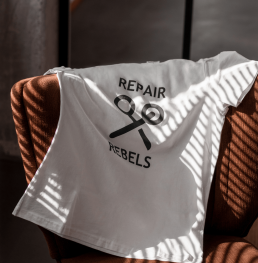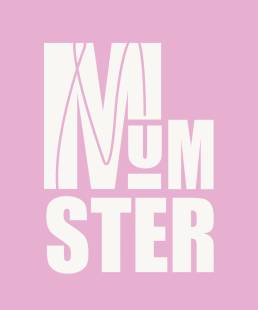Last month we had the pleasure to attend Neonyt in Düsseldorf. It was a fantastic experience that allowed us to meet so many inspiring people including some groundbreaking fashion pioneers! Watch the full video report here.
The event brought together international brands, thought leaders and the media with an exciting mix of knowledge, innovations and networking opportunities. We spent most of the time at Prepeek, the exclusive section for the media-focused community where thought-provoking talks took place addressing relevant topics such as Greenwashing and Circularity. Chanel Trapman, the founder of MUMSTER spoke alongside Anna Agtas, founder of Ikigo Studios and Melina Sachtleben, a researcher in the field of sustainable textile products and processes. They talked about how to develop a circular economy within fashion and talked about challenges and solutions needed to educate people and put infrastructure in place to make circularity mainstream. It was an insightful conversation that really highlighted the power of collaboration between different stakeholders to drive technological innovations, legislation and education. The key message was the importance of involving everyone and joining forces to shift the current linear system to a circular one. The talk was followed by the screening of the Full Circle documentary.
In a relaxed, friendly atmosphere, we got to talk to many interesting people in the sustainable fashion movements and had fun with Dainty Distopia’s natural dye workshop where we got to dye a scrunchie using things like onion peel and tree bark, the results were mindblowing! The most rewarding part of the event was getting to know many groundbreaking fashion changemakers, both brands and organisations, from which we learnt so much!
"We don’t have to become a huge brand, we just want to show the world that it is possible to do better". Cristiana Costa, Founder of Näz, a sustainable fashion brand.

We were especially impressed by Näz, a Portuguese brand that believes that tradition can go side by side with sustainability. They proved it possible to create a brand that respects culture, people and the planet. Their core values are transparency, sustainability and respect. They share all the information about their manufacturing processes and ensure fair working conditions by keeping the production in Portugal where possible. In terms of materials they prioritise deadstock in order to reduce waste and give a new life to surplus fabrics. When that’s not an option their materials of choice are linen, organic cotton and lyocell. Their commitment to sustainability shines through every aspect of the brand, even after the clothes are sold to the customer they make sure to educate them on the best way to care for the garments and extend their life and offer the option to resell the garments through their website, to ensure they have a new life!
What we love about Näz is that they’re constantly improving and working towards both social and environmental sustainability by setting ambitious targets and acting upon them. Their goal is to have a positive social impact and by working with small, family-owned factories they aim to combine their skills and traditional knowledge to create a more modern, environmentally friendly product. They are determined to bring recycling back into the mainstream in Portugal, reigniting the tradition of reusing and repurposing textiles. Näz is currently collaborating with 4 factories that utilise pre-consumer waste to make high quality fibres such as recycled alpaca wool and the goal is to work with them to develop a system for post consumer recycling. It is currently challenging because it’s a very manual and labour intensive activity yet many consumers expect recycled garments to cost less, but Näz believes that it’s a good opportunity to make a social impact by involving elderly people and creating more meaningful job opportunities. The founder of Näz, Cristiana, also believes regulation is extremely important to drive change in the fashion industry but more people from inside the industry who are aware of the challenges should be actively involved and aid in the development of the upcoming European- wide legislation. Näz is also the first BCorp certified company in Portugal and they are helping other fashion brands in obtaining the certification!
"I want everyone to benefit from globalisation, not just me as a white person in the global north but give back the profits and empowering those in the global south as well". Lorena Gerstner, Founder of Verdonna.

Another fashion pioneer we were really touched by was Verdonna. With their gorgeous hats and beautifully garments handmade by Peruvian artisans. They combine traditional craftsmanship, modern shapes, natural colours and textures to create high-quality, one-of-a-kind stylish pieces that are made to last. A big part of their work focuses on female empowerment. To break away from patriarchal structures and allow women to be independent, Verdonna, together with local partners, organises regular training courses on a range of topics, helping craftswomen develop their confidence, determination and regain their freedom by learning new skills. To further prove its commitment to ethical manufacturing, Verdonna sets fair purchasing conditions that provide Peruvians with a stable source of income. They do so by allowing their partners in Peru to calculate the prices themselves instead of haggling for the lowest price. By doing so, the proceeds of their craftsmanship allow women to take their lives into their own hands. Verdonna aims to open up their supply chain including their network of craftswomen to other brands through white-label projects to bring industry-wide change through joint efforts that can promote a holistic, inclusive view of sustainability that allows for improvements, innovations and growth for the Peruvian textile industry.
Verdonna only uses alpaca wool for their hats. The benefits of this fibre are endless, it’s soft, light, breathable and hypoallergenic, and it’s also very durable as it doesn’t pill. Furthermore Alpaca wool doesn’t degrade the pastureland as the Alpacas only feed on the upper part of the flora there, without removing the roots of the plants so they cause no harm to the Peruvian soils. It’s also worth noting that the alpacas are treated with the utmost respect as a part of the traditional identity of the small farmers who earn their livelihood from the wool of the animals. They live freely in small herds and are only brought together once a year for shearing during the summer to avoid them getting too hot. The ethos of this brand is extremely inspiring and admirable. They show that it’s possible to create timeless, unique and elegant products without harming animals, humans or the planet.

Repair Rebels was another company that caught our attention at Neonyt who is also very inspiring with their mission to reduce waste and increase the lifespan of fashion items. They love fashion and believe our garments deserve more appreciation so they created a platform that combines modern technology and traditional craftsmanship. By fostering a culture of slow fashion and nurturing respect for things that we already own, Repair Rebels are fully embracing the circular economy. Repair Rebels champions the notion that repairs not only save us a lot of CO2 emissions and time, but they are also cheaper and create local jobs. Repairing allows you to wear your garments for longer meaning you can make more memories in them and spend less money on new clothes. Repair Rebels make textile and shoe repairs as fashionable and easy as buying new items. They are making repair accessible and attractive with the ability to book repairs online, arranging pick up and drop off for a simple, all-round digital service from collection to delivery. Repair Rebels is truly embracing slow fashion and we couldn’t be prouder of their work!
Another business offering services that are driving sustainability forward in fashion is Bluesign Technologies. Talking to them taught us how important a holistic supply chain assessment is for fashion brands. Bluesign’s goal is to motivate suppliers, manufacturers and brands to reduce the overall footprint of textiles, with a particular focus on the chemicals used in garment manufacturing. As a solution provider, Bluesign acts as an independent verifier to ensure trust and transparency, supporting the industry in its efforts to improve its sustainable processes, step by step. They equip brands, manufacturers and chemical suppliers with comprehensive sustainability solutions so that the industry continuously fosters safer work environments improving environmental responsibility, deepening consumers’ trust.

Oeko Tex is another very inspiring company we met that’s working with fashion brands to manage due diligence in their supply chains. Through an array of certifications and strict standards that aim to make every step of the fashion value chain less impactful. Oeko Tex was founded with the aim to ensure textile products are harmless to human health, this led to the development of the OEKO-TEX® STANDARD 100, which is now one the world’s best-known and most trusted certification for product safety. Three decades later, they are made up of 17 independent textile and leather testing institutes, and offer an extensive product portfolio. Driven by sustainability and a dedication to transparency, Oeko Tex’s work is grounded in proven science, setting standards that allow everyone to make responsible decisions and protect natural resources.
Neonyt taught us the power of collaboration. The benefits of joining forces to achieve real improvements in the fashion sector and putting resources together to make sustainability more accessible, attractive and profitable. After hearing from a multitude of experts and driven individuals from different fields, we believe that cooperation will be essential to achieve genuine sustainability in fashion.
Related Posts
December 18, 2023
The True Impact of Vegan Handbags: How Lisa Marin’s life cycle analysis proves their products are better for the planet than (faux) leather alternatives.
Handbags are one of the most prominent…
September 1, 2023
A Tool for Change: Unveiling the Visionaries of Sustainable Fashion
In a world dominated by fast fashion…
August 16, 2023
Driving Change in the Fashion Industry: Lessons from the Copenhagen Global Fashion Summit 2023
The fashion industry has long been…



